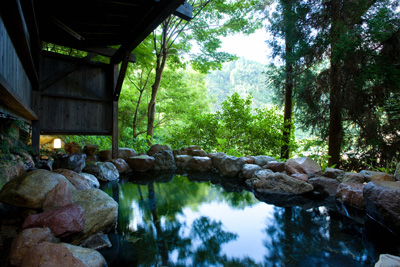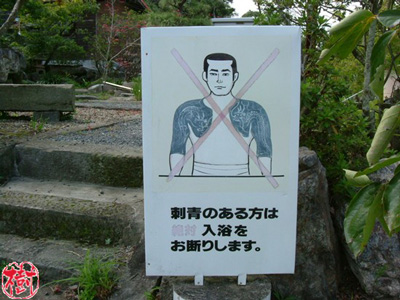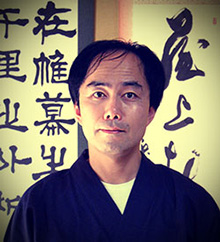Tattoos and Onsen
Convert your name or your favorite word into Kanji! Why not use it for T-shirts, stamps, stickers or tattoos?
Convert your name or your favorite word into Kanji! Why not use it for T-shirts, stamps, stickers or tattoos?
Last updated : 19.3.2020
Author : Akira Katakami
 Onsen are traditional Japanese hot springs where you can enjoy a hot bath, plus the additional benefits of the minerals in the water. These minerals make the skin quite smooth and are claimed to have various health benefits. So what do they have to do with tattoos?
Onsen are traditional Japanese hot springs where you can enjoy a hot bath, plus the additional benefits of the minerals in the water. These minerals make the skin quite smooth and are claimed to have various health benefits. So what do they have to do with tattoos?
Well, as I am sure many of you have heard, at most onsen you are not allowed to enter if you have a tattoo of any sort. If you go to an onsen, there is a good chance that you may see signs posted outside saying that tattoos are forbidden. The reason for this is that tattoos are historically associated with the yakuza in Japan.
There is a trend in the way of acceptance of tattoos in Japanese onsen. Nowadays, there are even onsen where tattoos are completely allowed, however, this is not yet the standard by any means. At the majority of onsen tattoos are still not acceptable, though as you will see below, there are some ways to enter the onsen even if you have a tattoo.
But are tattoos actually forbidden?
 Well, strictly speaking, yes, they are forbidden. However, upon doing a bit of research, if your tattoo is in an area that is not noticeable (behind the ear, in between your fingers, etc.), you should not have any problems entering the onsen. Some onsen may even be more lenient toward foreigners with tattoos, however, this is not a guarantee by any means.
Well, strictly speaking, yes, they are forbidden. However, upon doing a bit of research, if your tattoo is in an area that is not noticeable (behind the ear, in between your fingers, etc.), you should not have any problems entering the onsen. Some onsen may even be more lenient toward foreigners with tattoos, however, this is not a guarantee by any means.
Please do remember that clothing is not allowed in the onsen, so even tattoos that may be normally hidden with clothing may be very obvious once in the onsen.
While tattoos covering large portions of the body would be rather difficult to hide, small to medium sized tattoos may be covered up using some sort of bandage. They key to this is to not make it too obvious that you are trying to hide a tattoo and make it look at natural as possible. Make sure to be careful that no part of the tattoo is showing through the bandage.
I have also read recommendations advising to cover up the tattoo using certain cosmetics. While this may be an option in some cases, please note that before entering the onsen you must wash your body completely, so I would recommend waterproof cosmetics if possible. Please make sure not to use any sort of product that may smear off in the onsen.
At many onsen, you can also choose to use the “kazokuburo” (literally translates as “family bath”) or kashikiriburo (“reserved bath”). This essentially means that you will have a small, private onsen to yourself. These are usually also open air (“rotenburo”) onsen, so it’s as if stepping onto a veranda with a nice hot onsen on it.
Kazokuburo are private, so anyone may enter even if they may have a tattoo. Although, kazokuburo are more expensive than using the public parts of the onsen, you can enjoy the onsen by yourself, while not having to worry about trying to hide your tattoo!
Although having a tattoo may sometimes make it difficult for someone to enter the onsen, please remember that you still have many options available! If you are unsure or worried about covering up your tattoo, please look for one of the above mentioned tattoo friendly onsen. Many prefectures have these sort of onsen, so there is no need to be discouraged! If not, there’s always the kazokuburo to try!

Seigakudou(静岳堂)
Seigakudou(静岳堂), a working calligrapher and native Japanese, will write your name in Kanji. Rather than a computer font, your kanji name will be hand-brushed by a professional calligrapher.

Akira Katakami(片上明)
The translation from English to Japanese will be undertaken by a professional native Japanese translator with a kanji proficiency qualification, you can be sure of an error free standard. Also, an explanation of your kanji name will be provided in English.